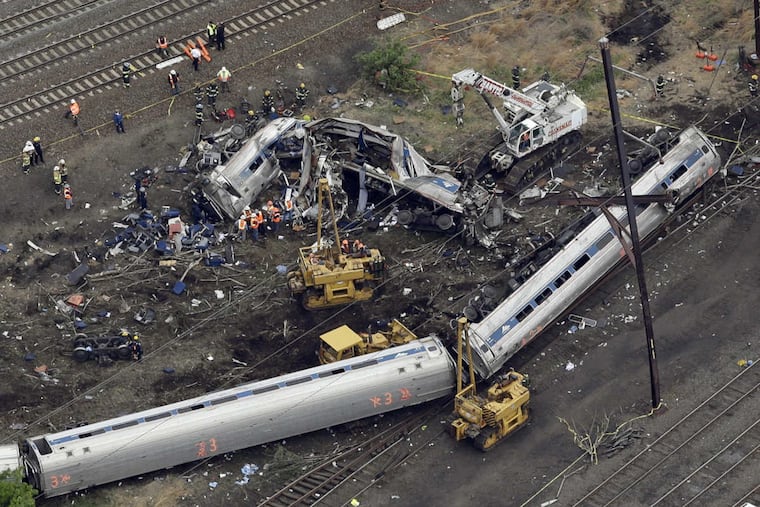Pa. attorney general announces charges against Amtrak engineer
The dramatic action started by Marsha Neifield, president judge of Philadelphia Municipal Court, had come as the statute of limitations on charging engineer Brendon Bostian was about to run out.

In a stunning turn for a case that seemed all but concluded earlier this week, Pennsylvania Attorney General Josh Shapiro filed criminal charges Friday night against the engineer of the Amtrak train that derailed in Philadelphia in May 2015, resulting in the deaths of eight people.
The charges include eight counts of involuntary manslaughter, one count of causing or risking a catastrophe, and numerous counts of reckless endangerment.
The chain of events leading to Shapiro's announcement, contained in a short statement, began Thursday, when Municipal Court President Judge Marsha Neifield effectively overturned a decision by the Philadelphia District Attorney's Office not to prosecute Brandon Bostian.
Neifield ordered the District Attorney's Office to charge Bostian with involuntary manslaughter and reckless endangerment in connection with the derailment, which also left more than 200 people injured.
A short time later, the District Attorney's Office announced that it would refer the charges to Shapiro's office, arguing that it had a conflict of interest because it had already decided not to charge Bostian.
"The action by the Attorney General's Office, which includes eight counts of involuntary manslaughter, is the correct course, and it is in the best interest of the public to hold Mr. Brandon Bostian accountable," said Thomas R. Kline, one of several lawyers who pressed Neifield to authorize charges against Bostian. "I firmly believe that the overwhelming evidence of Brandon Bostian operating a train at 106 mph in a 50 mph zone, around a curve, consciously accelerating and then consciously decelerating, while having responsibility for the safety of 248 people meets the standard of reckless endangerment."
Efforts to reach Bostian's lawyer, Robert Goggin, on Friday night were unsuccessful. ABC News reported that Goggin has rarely commented and did not return messages seeking comment this week. Goggin has said his client has no recollection of the accident. The NBC affiliate in Boston visited Bostian's home in nearby Somerville, but no one answered the door.
Central to the case is what prosecutors need in the way of evidence to show that Bostian was criminally negligent. In announcing Tuesday that it would not charge Bostian, the District Attorney's Office said there was not enough evidence to establish criminal responsibility.
But at a Thursday news conference, lawyer Richard A. Sprague, a former Philadelphia first assistant district attorney who went to court seeking the order from Neifield, likened Bostian's conduct to that of a motorist who killed pedestrians while speeding through Center City.
"Can you imagine someone driving down Market Street," Sprague said, "at 100 mph, hitting people, killing people, and the DA saying, 'We don't have a basis for prosecuting anybody'?"
Amtrak Train 188 derailed in the early evening of May 12, 2015, from a northbound track in the Port Richmond section. Bostian had accelerated the train to 106 mph, more than twice the speed limit, just as it entered the Frankford Junction curve. He told investigators for the National Transportation Safety Board that he had no memory of the moments leading up to the crash and could not explain what happened.
The NTSB said there was no evidence of drugs or alcohol in Bostian's system. Bostian likely was distracted by reports that someone had thrown rocks at a nearby SEPTA train and became disoriented about where he was, the NTSB said.
The Pennsylvania Supreme Court established the standard for proving criminal negligence in Commonwealth v. Huggins, a 2003 decision involving criminal involuntary manslaughter charges against a man who fell asleep at the wheel of his van, which was carrying 21 children and three adults, many not wearing seat belts. Two children died in the ensuing crash.
The trial court initially dismissed the charges, saying the prosecution had not established that the driver was aware of the danger he faced as he fell asleep at the wheel.
The Supreme Court reinstated the charges, finding that awareness of risk is a key element of the criminal charge, and that in the instance of the driver, that threshold was met because people typically are faced with warning signs, such as drowsiness, before they fall asleep. The driver chose to ignore that risk and continued to operate his vehicle at high speed, the Supreme Court said, resulting in the crash.
Neifield's order that the Amtrak case be reopened set off a tumult of media coverage, with the decision drawing national attention. Neifield, a Temple University Law School graduate, is highly regarded, said Temple law professor Jules Epstein. As president judge of Municipal Court, she is responsible for judicial scheduling and supervision, and oversees the administrative operations of the civil and criminal divisions.
Sprague sought the order along with plaintiffs' lawyers Kline and Robert Mongeluzzi, who represent dozens of victims in lawsuits against Amtrak.
"This is the second anniversary of a horrific event," Mongeluzzi said. "Three days ago, the victims of Amtrak Train 188 felt that justice was derailed, and today they feel that justice is back on track."
Amtrak took responsibility for the crash and has since installed an automatic braking system on its Northeast Corridor rails that would have prevented the derailment.